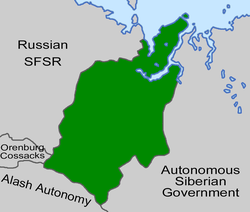The Siberian Republic (Russian: Сибирская Республика, Sibirskaya Respublika; July 17, 1918 – November 3, 1918) was an unrecognized short-lived state that existed on the territory of Russia during the Civil War.
Siberian Republic Сибирская Республика (Russian) Sibirskaya Respublika | |||||||||
|---|---|---|---|---|---|---|---|---|---|
| 1918–1918 | |||||||||
|
Flag | |||||||||
 | |||||||||
| Status | Unrecognized state | ||||||||
| Capital | Omsk | ||||||||
| Common languages | Russian (pre-reform) | ||||||||
| Government | Parliamentary republic | ||||||||
• Chairman of the Provisional Government | Pyotr Vologodsky | ||||||||
• Chairman of the Administrative Council | Ivan Serebrennikov | ||||||||
| History | |||||||||
• Established | July 17 1918 | ||||||||
• Disestablished | November 3 1918 | ||||||||
| Currency | Siberian ruble | ||||||||
| |||||||||
Background
editThe appearance of the Siberian Republic was the result of many years of struggle by Siberian regionalists for the sovereignty of the region. The ideology of the Siberian Republic was Siberian regionalism (supporters, who occupied the majority of ministerial posts in the government of the new state)
History of the Republic
editExecutive power belonged to the Provisional Siberian Government, which was located in Omsk,[1] legislative power belonged to the Siberian Regional Duma. The basis of the armed forces was the Siberian Army, which consisted of several tens of thousands of people.
On July 4, 1918, in Omsk, the Provisional Siberian Government, headed by Pyotr Vologodsky, adopted the "Declaration of Independence of Siberia", canceled on November 3, 1918.
Inside the Siberian Republic, there was a struggle between the liberal wing (Provisional Siberian Government) and the socialist wing of regionalism (Siberian Regional Duma), which ended in the fall of 1918 with the dissolution of the Siberian Regional Duma.[1] The consequences of the conflict were the crisis of Siberian statehood, the collapse of the Cabinet of Ministers, the weakening of civilian and strengthening military power, in a series of uprisings.[2] The liberal movement of the oblasts entered into an alliance with the all-Russian political forces and sacrificed the idea of Siberian separatism in order to consolidate the white forces for an attack on Moscow.[3]
The Siberian Republic was self-liquidated after the formation of the white Russian state and the Provisional All-Russian Government on September 23, 1918, got control over Siberia in accordance with the declaration of November 3, 1918.[1]
Leadership
editHead of state
edit| Name | Office | Start of authority | End of authority |
|---|---|---|---|
| Pyotr Vologodsky | Chairman of the Provisional Siberian Government | June 30, 1918 | November 3, 1918 |
Heads of government
edit| Name | Office | Start of authority | End of authority |
|---|---|---|---|
| Pyotr Derber | Chairman of the Council of Ministers | January 29, 1918 | July 21, 1918 |
| Ivan Lavrov | Chairman of the Council of Ministers | July 21, 1918 | October 22, 1918 |
References
edit- ^ a b c Сушко 2009.
- ^ Никитин 2007.
- ^ Сушко 2010.
Literature
edit- Гинс, Г. К. Сибирь, Союзники и Колчак. Пекин: Общество Возрождения России., 1921. — Том 1, Том 2.; [1] Москва: Айрис-Пресс, 2008. — ISBN 978-5-8112-3010-5.
- "Declaration of the Provisional Siberian Government on the state independence of Siberia" Декларация Временного Сибирского Правительства о государственной самостоятельности Сибири. Provisional Siberian Government. July 4, 1918.
- Сушко, А. В. [Sushko, Valentina] (June 2009). Сибирский национализм и борьба за власть в крае (март 1917 — ноябрь 1918 г.) [Siberian nationalism and the struggle for power in the region (March 1917 – November 1918)] (PDF). Вестник Томского государственного университета [ Tomsk State University Bulletin] (in Russian). 323: 174–179. ISSN 1561-7793.
{{cite journal}}: CS1 maint: multiple names: authors list (link) - Сушко, А. В. (2010). Процессы суверенизации в Сибири (февраль 1917—1923 гг.) : Дисс. … д-ра ист. наук : 07.00.02 (Thesis). Омск. — § 4.1. Образование сибирской государственности и её ликвидация.
- Гордеев, О. Ф. (2003). Аграрная политика временных государственных образований в Сибири в годы гражданской войны (Конец 1917−1920 гг.) : Дисс. … д-ра ист. наук : 07.00.02. Красноярск.
{{cite book}}: CS1 maint: location missing publisher (link) — РГБ ОД, 71:04-7/61. - Никитин, А. Н. (2007). Государственность «белой» России: становление, эволюция, крушение (1918−1920 гг.): Автореферат дисс. … д-ра юрид. наук : 12.00.01. Москва: Московский университет МВД России. Archived 2014-08-08 at the Wayback Machine
- Лончаков, Ю. Г. (1997). Аграрная политика временных государственных обрагований на территории Сибири (1918 −1919 гг.) Дисс…. канд. ист. наук. Новосибирск.
{{cite book}}: CS1 maint: location missing publisher (link) - Шиловский, М. В. (1994). Хроника областнического движения в Сибири (1852−1919) (Материалы к хронике общественного движения в Сибири в 1895−1917 гг. ed.). Томск. pp. 6−16. Сайт Томской областной универсальной научной библиотеки им. А. С. Пушкина (oblastnichestvo.lib.tomsk.ru)
{{cite web}}: CS1 maint: postscript (link) - Комарицын, С. Комарицын Сергей. Сибирская весна // Сайт муниципальной газеты Красноярска «Городские Новости» (gornovosti.ru), 12.07.2013. — № 2801..
